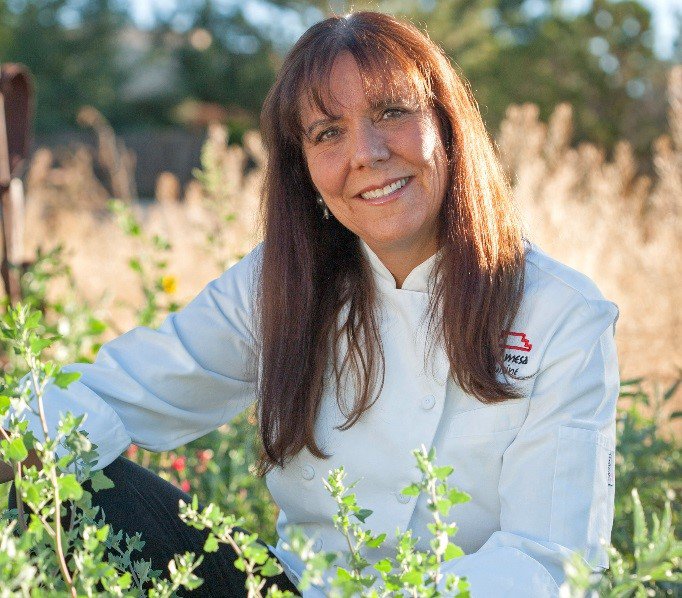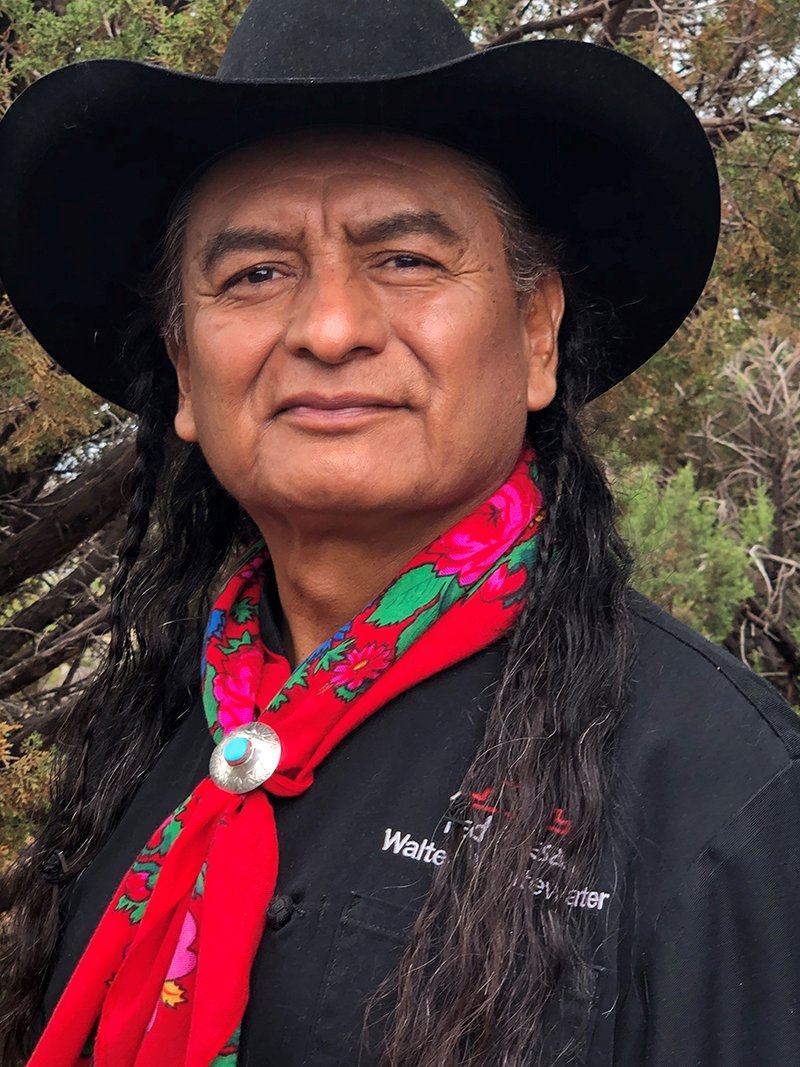- OU Homepage
- Search OU
- OU Social Media
- The University of Oklahoma
VIRTUAL SPEAKER SERIES
REGISTRATION IS NOW OPEN
MORNING KEYNOTE SPEAKERS
Lois Ellen Frank, PhD
Lois Ellen Frank, PhD is a Santa Fe, New Mexico based Chef, a Native foods historian, culinary anthropologist, educator, James Beard Award winning cookbook author, photographer and organic gardener. She is the chef/owner of Red Mesa Cuisine, LLC, a catering company specializing in the revitalization of ancestral Native American cuisine with a modern twist where she cooks with Native American chef Walter Whitewater. Their mission is to feed the body and nurture the soul. Dr. Frank has spent many years documenting and working with foods of Native American communities in the Southwest culminating in her James Beard Award winning cookbook, Foods of the Southwest Indian Nations.
Together as part of the U.S. State Department and Consulate General’s Culinary Diplomacy Program Chefs Frank and Whitewater traveled to Ukraine (2013), the United Kingdom (2105) and Russia (2016) to teach about the history of Native American foodways, work with food as a form of diplomacy to create dialogue and educate people on the Native American food contribution shared with the world and how these native foods have influenced many of the foods, we now eat every day. The two chefs traveled to Guam to work with the Humanities Guåhan in 2011 on the revitalization of traditional foods and foodways in Guam.
Dr. Frank works with the Physician’s Committee (PCRM) on a program entitled The Power to Heal Diabetes: Food for Life in Indian Country HYPERLINK "http://www.nativepowerplate.org" www.nativepowerplate.org that uses the Ancestral Native American diet for health and wellness in Native Communities.
She is a cooking instructor at the Santa Fe School of Cooking and an adjunct professor at the Institute of American Indian Arts (IAIA).
In 2020, she was the recipient of the Local Hero Olla Award, which recognizes an exceptional individual for the work they do to create healthy, innovative, vibrant, and resilient local sustainable food systems in New Mexico.
For convenience, the American Indian Institute at the University of Oklahoma is providing a link to the speaker’s website, provision of the link does not constitute an endorsement of any company, services, or products.
To learn more about Red Mesa Cuisine, visit www.redmesacuisine.com


Walter Whitewater
Walter Whitewater grew up in Pinon, Arizona on the Navajo Nation. He began cooking professionally in 1992 in Santa Fe, New Mexico and worked in many restaurants preparing different cuisines. He is presently a chef at Red Mesa Cuisine, LLC a Native American Catering company in Santa Fe, specializing in using ancestral Native American ingredients with a modern twist where he cooks with chef Lois Ellen Frank, Ph.D. Chef Whitewater worked on the James Beard Award winning cookbook, Foods of the Southwest Indian Nations.
Chef Whitewater has appeared on numerous foods TV Network cooking shows featuring foods of the Southwest and a video (November 2018) on Native American Cuisine from a series entitled “In Real Life” by AJ+ https://redmesacuisine.com/videos-1
Together as part of the U.S. State Department and Consulate General’s Culinary Diplomacy Program Chefs Frank and Whitewater traveled to Ukraine (2013), the United Kingdom (2105) and Russia (2016) to teach about the history of Native American foodways, work with food as a form of diplomacy to create dialogue, and educate people on the Native American food contribution shared with the world and how these native foods have influenced many of the foods we now eat every day. The two chefs traveled to Guam to work with the Humanities Guåhan in 2011 on the revitalization of traditional foods with the Chamorros.
Chef Whitewater was the first Native American chef to cook at the James Beard House in New York City. He won the James Lewis Award in 2008 from BCA Global for his work as a Native chef revitalizing Indigenous Cuisine.
Chef Whitewater works with the Physician’s Committee (PCRM) on a program entitled The Power to Heal Diabetes: Food For Life in Indian Country www.nativepowerplate.org that uses the Ancestral Native American diet for health and wellness in Native Communities.
He is very active on using Ancestral and contemporary Native American foods for health and wellness in Native American communities.
EVENING KEYNOTE SPEAKER
Dr. Cornel Pewewardy (Comanche-Kiowa)
Comanche Nation Vice Chairman
Co-Producer/Scholar and Indigenous Consultant
Dr. Cornel Pewewardy (Comanche-Kiowa) is Professor Emeritus, Indigenous Nations Studies at Portland State University. Dr. Pewewardy’s research explores the theoretical and philosophical foundations of postcolonial Indigenous research paradigms that focused on historical and political insight into the lingering impact of colonization, considering the issues faced by Indigenous peoples today and identities to survive in the twenty-first century.
Across his work, Professor Pewewardy seeks to advance policy and practice that address persistent racial and socioeconomic inequities within Indigenous education and reflect the voices and expertise of historically underserved families and communities. From his early work as an educational administrator to more recent work on creating Indigenous charter schools, he focuses on strategies to enhance higher education institution’s connectivity and partnerships with Indigenous nations to advance the education of Indigenous students and explore university-tribal engagement. In addition, he and colleagues have been working closely with teachers and school leaders to construct a progressive model specific to the continuum of consciousness educators experience as they develop their understanding and employment of decolonizing theories and pedagogies.
Growing up in southwest Oklahoma surrounded by traditional music of the Comanche and Kiowa, the smell of burning wood and cedar inside a peyote tipi, and the aroma of kiln firings of a sweat lodge, it cemented an early foundation of Indigenous music especially singing round dance and gourd dance songs and playing the Native flute, that would be invaluable later in life when Dr. Cornel Pewewardy decided that traditional music would be a part of his pedagogical classroom teaching.
As a dedicated singer of 40 years on the Southern Plains powwow drum, composer of traditional Comanche warrior songs and flute player, Dr. Pewewardy’s career is shaped by learning from Elder tribal singers. Inspired by American Indian Movement leaders like Clyde Warrior, John Trudell and Floyd Westerman, Cornel focuses his singing on traditional warrior songs.
Cornel’s current artist portfolio goes deeper into traditional Indigenous music, entertainment, performing arts, speaking voice over work, commercial work, film, and publishing.
PREVIOUS SPEAKERS

